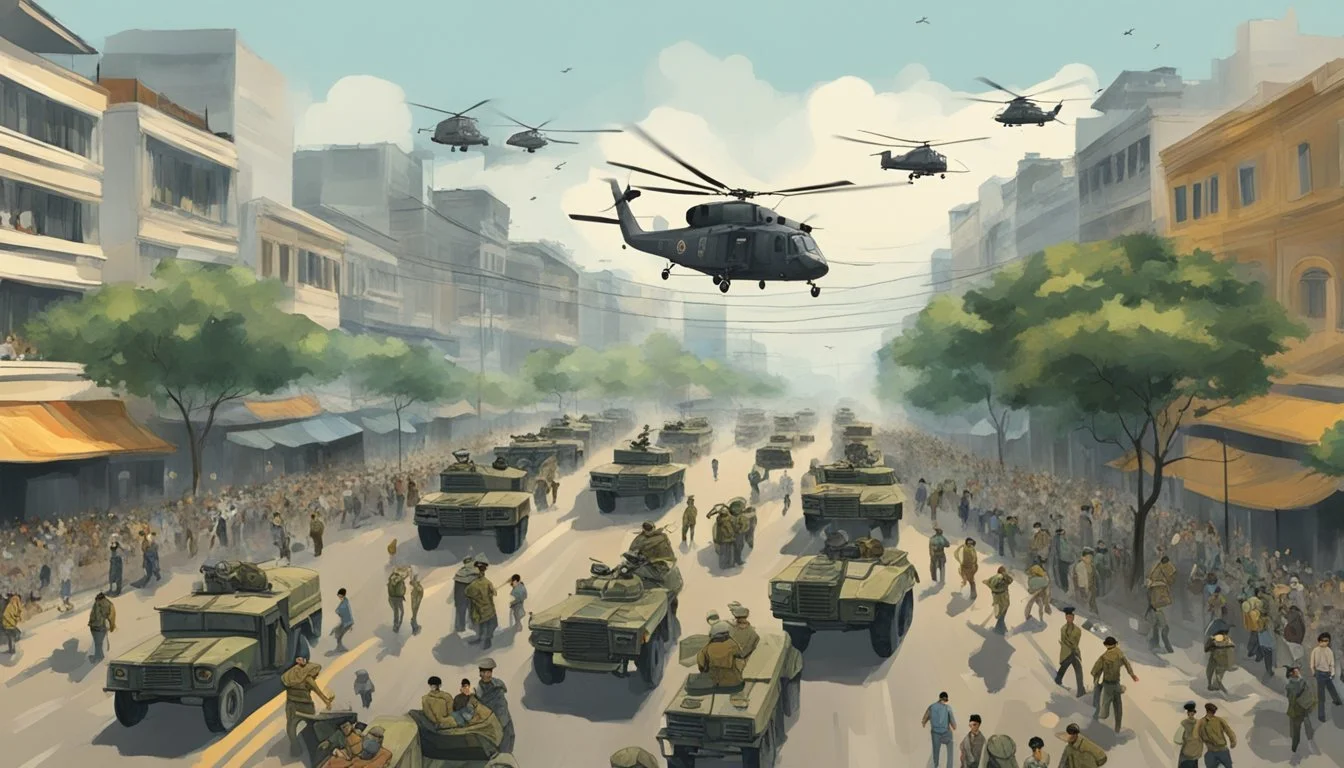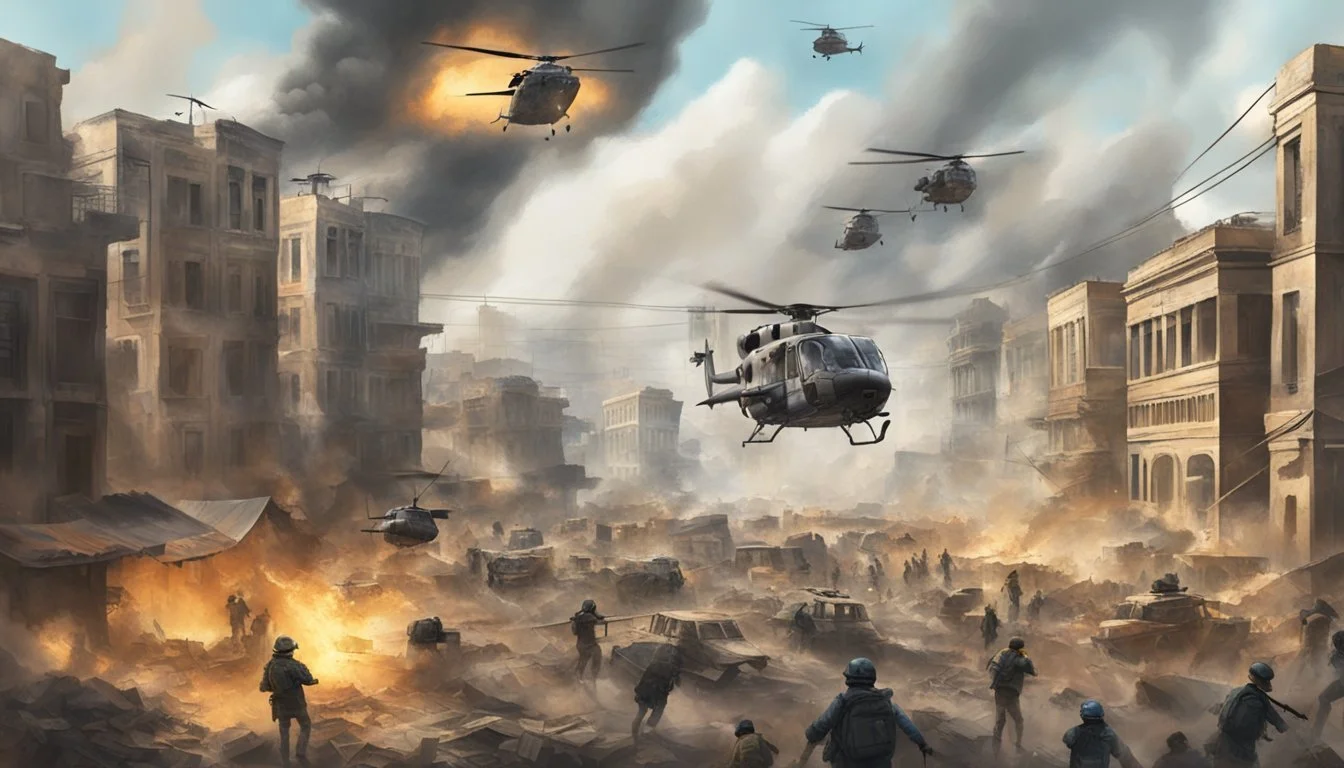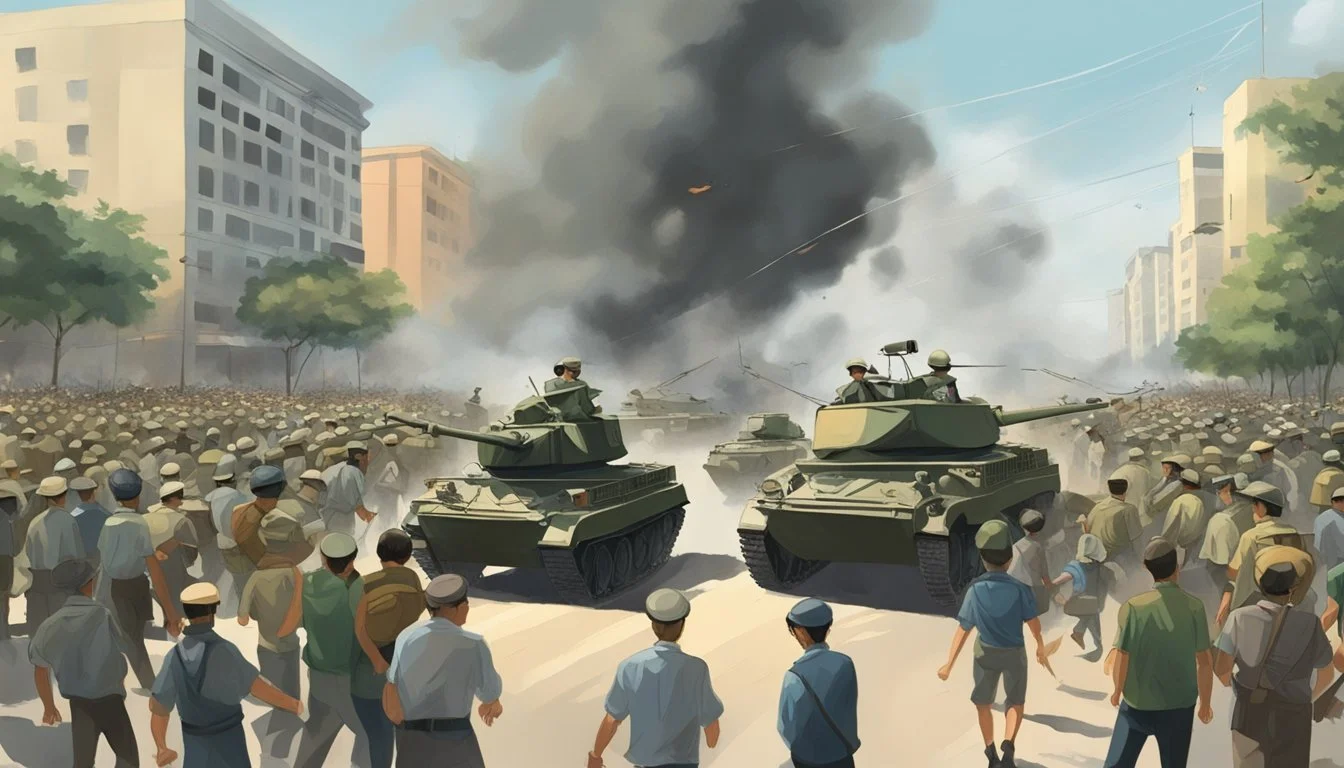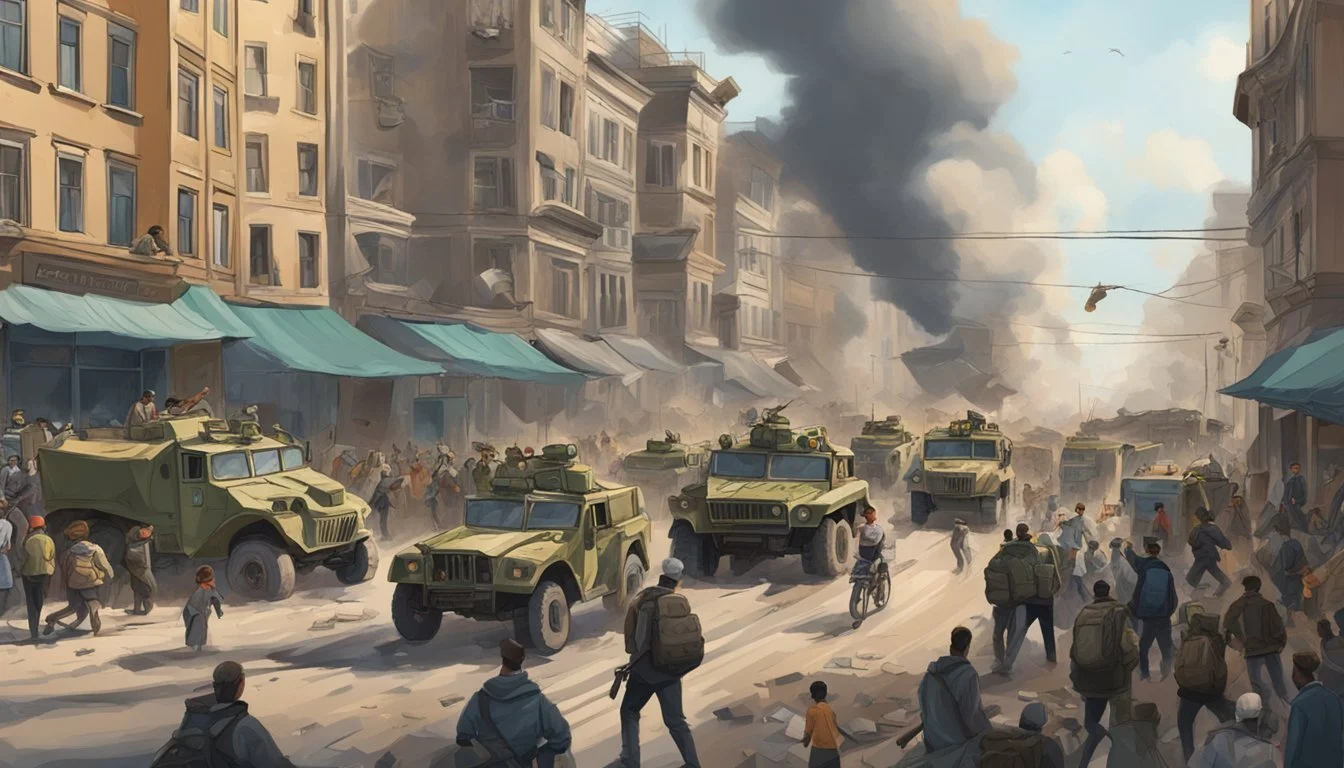Fall of Saigon: 7 Films on the Final Days of the Vietnam War
Cinematic Perspectives on a Historic Moment
The Fall of Saigon marked the dramatic conclusion of the Vietnam War in April 1975. As North Vietnamese forces closed in on the South Vietnamese capital, chaos ensued as Americans and their Vietnamese allies scrambled to evacuate. This pivotal historical moment has been depicted in numerous films over the decades since.
Several compelling documentaries and dramatic features explore the final days of the Vietnam War and the fall of Saigon from various perspectives. These films chronicle the frantic evacuation efforts, the experiences of soldiers and civilians caught in the crossfire, and the long-lasting impacts of the war's end on individuals and nations. Through a mix of archival footage, interviews, and dramatizations, they bring this tumultuous period to life for viewers.
1) Heaven & Earth (1993)
"Heaven & Earth" is Oliver Stone's third film in his Vietnam War trilogy. It tells the story of Le Ly Hayslip, a Vietnamese woman who survives the turmoil of the war.
The film is based on Hayslip's autobiographical books "When Heaven and Earth Changed Places" and "Child of War, Woman of Peace." It offers a unique perspective on the conflict through the eyes of a Vietnamese civilian.
Tommy Lee Jones, Joan Chen, and Hiep Thi Le star in this biographical war drama. The narrative follows Le Ly's journey from her village in Central Vietnam to her experiences in America.
Stone's direction brings to life the struggles faced by Vietnamese civilians during the war. The film explores themes of survival, cultural identity, and the lasting impact of conflict on individuals.
"Heaven & Earth" provides a different viewpoint compared to many other Vietnam War films. It focuses on the war's effects on the Vietnamese people rather than American soldiers.
https://en.wikipedia.org/wiki/Heaven_%26_Earth_(1993_film)
2) The Deer Hunter (1978)
"The Deer Hunter" is a powerful epic war drama directed by Michael Cimino. The film follows three Slavic-American steelworkers whose lives are profoundly impacted by their experiences in the Vietnam War.
Robert De Niro, Christopher Walken, and John Savage portray the central characters. The movie explores themes of friendship, trauma, and the psychological toll of war.
The film's depiction of Russian roulette scenes in Vietnam sparked controversy. Critics argued these scenes were historically inaccurate and sensationalized. Despite this, the film received critical acclaim for its emotional depth and performances.
"The Deer Hunter" won multiple awards, including five Academy Awards. It is recognized for its intense portrayal of the war's effects on individuals and communities back home.
The movie's final act returns to Vietnam, showing the lasting impact of the conflict on its characters. It provides a stark look at the aftermath of war and its lingering consequences.
[https://en.wikipedia.org/wiki/The_Deer_Hunter]
3) Platoon (1986)
Oliver Stone's "Platoon" offers a gritty portrayal of the Vietnam War's final years. The film follows Chris Taylor, a young soldier navigating the harsh realities of combat and moral ambiguity.
"Platoon" stands out for its realistic depiction of warfare and the psychological toll on soldiers. Stone, a Vietnam veteran himself, drew from personal experiences to craft authentic battle scenes and character interactions.
The movie's climactic patrol sequence showcases the chaos and brutality of jungle combat. It culminates in a intense firefight that captures the desperation and confusion of the war's closing stages.
"Platoon" received critical acclaim for its unflinching look at the Vietnam conflict. It won four Academy Awards, including Best Picture and Best Director for Stone.
The film's impact extends beyond its artistic merits. Many veterans praised its realism, considering it an accurate representation of their experiences in Vietnam.
[https://en.wikipedia.org/wiki/Platoon_(film)]
4) Apocalypse Now (1979)
Apocalypse Now, directed by Francis Ford Coppola, is a surreal and haunting portrayal of the Vietnam War. The film follows Captain Willard's mission to assassinate the renegade Colonel Kurtz deep in the Cambodian jungle.
While not directly about the Fall of Saigon, Apocalypse Now captures the psychological toll and moral ambiguity of the conflict. Its iconic scenes and quotable dialogue have become deeply ingrained in popular culture.
The film's production was notoriously difficult, mirroring the chaos of the war itself. Coppola's ambitious vision and the challenging shooting conditions in the Philippines resulted in numerous delays and budget overruns.
Apocalypse Now features powerful performances from Martin Sheen, Marlon Brando, and Robert Duvall. The film's striking cinematography and use of Wagner's "Ride of the Valkyries" create unforgettable imagery.
Critically acclaimed upon release, Apocalypse Now won two Academy Awards and has since been recognized as one of the greatest films ever made. Its exploration of the human psyche in wartime continues to resonate with audiences today.
5) Full Metal Jacket (1987)
Stanley Kubrick's "Full Metal Jacket" offers a unique perspective on the Vietnam War. The film is split into two distinct parts, with the first half focusing on Marine boot camp training.
The second half of the movie shifts to Vietnam, depicting the experiences of U.S. Marines during the Tet Offensive and Battle of Huế in 1968. This portion provides a gritty, unflinching look at urban warfare.
Kubrick's meticulous attention to detail brings authenticity to the film's portrayal of combat. The movie's stark visual style and haunting soundtrack contribute to its intense atmosphere.
"Full Metal Jacket" stands out for its exploration of the psychological toll of war on soldiers. It delves into themes of dehumanization and the loss of innocence in combat.
The film's powerful performances, particularly by Matthew Modine and R. Lee Ermey, bring depth to the characters. Their portrayals highlight the complex emotions and experiences of those caught in the conflict.
https://en.wikipedia.org/wiki/Full_Metal_Jacket
6) Rescue Dawn (2006)
Rescue Dawn depicts the true story of Dieter Dengler, a U.S. Navy pilot shot down over Laos during the Vietnam War. Directed by Werner Herzog, the film stars Christian Bale as Dengler, who is captured and imprisoned in a Pathet Lao camp.
The movie focuses on Dengler's harrowing experiences as a prisoner of war and his eventual escape. It showcases the brutal conditions in the camp and the psychological toll on the captives.
Bale delivers a powerful performance as the resilient Dengler, alongside strong supporting roles from Steve Zahn and Jeremy Davies as fellow prisoners. The film's intense portrayal of survival and the human will to endure makes it a compelling addition to Vietnam War cinema.
Rescue Dawn offers a unique perspective on the conflict by exploring the lesser-known aspect of American POWs in Laos. Herzog's direction brings authenticity to the jungle settings and creates a tense, immersive atmosphere throughout the film.
[https://en.wikipedia.org/wiki/Rescue_Dawn]
7) Good Morning, Vietnam (1987)
"Good Morning, Vietnam" is a comedic take on the Vietnam War, starring Robin Williams as Adrian Cronauer, an irreverent Armed Forces Radio Service DJ. Set in Saigon in 1965, the film captures the early stages of American involvement in the conflict.
Williams' portrayal of Cronauer brings humor and energy to the war-torn setting. His character's unconventional broadcasting style boosts troop morale but clashes with military superiors.
The movie, directed by Barry Levinson, blends comedy with dramatic elements. It offers a unique perspective on the war, focusing on the power of laughter and entertainment amidst challenging circumstances.
While not strictly about the fall of Saigon, "Good Morning, Vietnam" provides insight into the American presence in Vietnam. It showcases the cultural tensions and the complex relationships between U.S. servicemen and Vietnamese civilians.
The film loosely draws inspiration from the real Adrian Cronauer's experiences. However, it takes creative liberties for dramatic effect, balancing historical context with Hollywood storytelling.
https://en.wikipedia.org/wiki/Good_Morning,_Vietnam
Historical Context
The Fall of Saigon marked the dramatic conclusion of the Vietnam War, a conflict that reshaped geopolitics and American society. This pivotal moment resulted from a complex series of military and political developments spanning two decades.
Overview of the Vietnam War
The Vietnam War began as a struggle between North and South Vietnam in the 1950s. The United States gradually increased its involvement, supporting South Vietnam against the communist North. By 1965, the U.S. had committed ground troops, escalating the conflict.
The war became increasingly unpopular in America, sparking widespread protests. Public opinion shifted as the conflict dragged on and casualties mounted. In 1973, the Paris Peace Accords led to the withdrawal of U.S. forces, leaving South Vietnam to fend for itself.
Key Events Leading to the Fall of Saigon
In 1975, North Vietnam launched a major offensive against the South. The South Vietnamese army, lacking U.S. support, quickly crumbled. As North Vietnamese forces approached Saigon, panic set in among South Vietnamese civilians and remaining Americans.
Operation Frequent Wind, the largest helicopter evacuation in history, began on April 29. U.S. personnel and some South Vietnamese allies were airlifted out of the city. On April 30, North Vietnamese tanks rolled into Saigon, effectively ending the war.
The city's capture symbolized the reunification of Vietnam under communist rule. It also marked a significant shift in Cold War dynamics and American foreign policy.
Impact on Vietnamese Society
The fall of Saigon had profound and lasting effects on Vietnamese society. It marked a turning point that reshaped the country's political, economic, and social landscape for decades to come.
Immediate Consequences
The North Vietnamese victory led to rapid changes in South Vietnam. Saigon was renamed Ho Chi Minh City. Many South Vietnamese officials, military personnel, and civilians fled the country, fearing reprisals. This exodus, known as the "boat people" crisis, saw hundreds of thousands risk their lives at sea.
Those who remained faced "re-education camps" and economic restructuring. Private businesses were nationalized. The new government implemented socialist policies across the reunified country.
Urban areas experienced significant disruption as the new regime consolidated power. Food shortages and rationing became common in the immediate aftermath.
Long-term Effects on Vietnam
The war's end brought political stability but economic challenges. Vietnam's isolation from Western countries and focus on centralized planning led to years of economic stagnation.
In the 1980s, Vietnam began economic reforms known as "Doi Moi." This shift towards a market economy gradually improved living standards.
Reunification efforts faced challenges. Cultural and economic differences between North and South persisted for years.
The war left a lasting impact on Vietnam's demographics. A generation of young men had been lost, affecting family structures and the workforce.
Environmental damage from the conflict, including the effects of Agent Orange, continued to impact agriculture and public health for decades.




